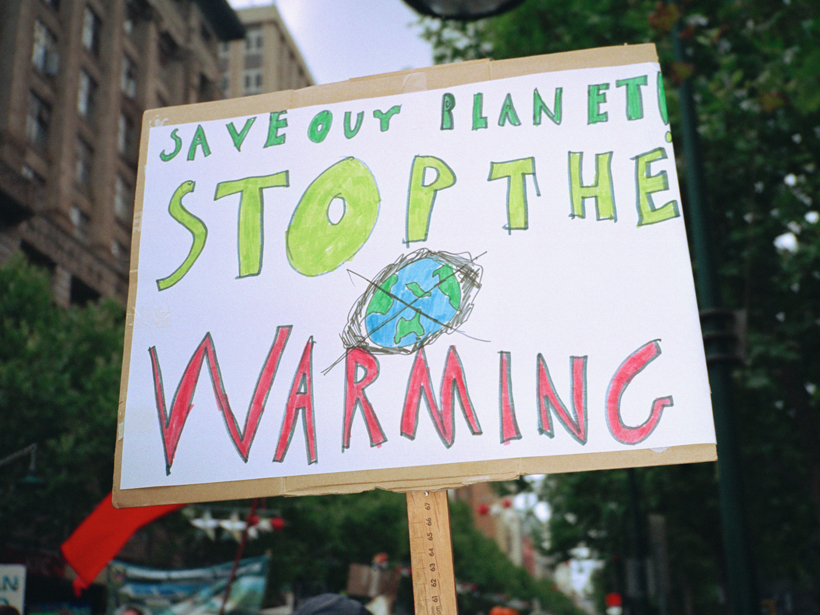Although the Trump administration is busily rolling back Obama era climate policies, it also allowed the release last Friday of a major report that runs counter to the administration’s own position on climate change. Scientists and policy experts told Eos that they think the administration allowed the report to be released on 3 November without political interference to avoid potential controversy about censorship.
“The Trump White House staff clearly judged that the firestorm if they tried to delay or suppress the report release would be greater than that from the findings themselves.”
“The Trump White House staff clearly judged that the firestorm if they tried to delay or suppress the report release would be greater than that from the findings themselves, even though the report utterly contradicts nearly all Trump Administration climate science and policy statements,” Paul Bledsoe, who helped release the first national climate assessment in 2000 while serving in the Clinton administration as communications director of the White House Climate Change Task Force, told Eos. Bledsoe currently is a lecturer at American University’s Center for Environmental Policy in Washington, D. C.
The Climate Science Special Report, prepared by the U.S. Global Change Research Program (USGCRP), which comprises 13 federal agencies, concludes that “it is extremely likely that human activities, especially emissions of greenhouse gases, are the dominant cause of the observed warming since the mid-20th century.” The report—volume 1 of the Fourth National Climate Assessment, a quadrennial report mandated in the Global Change Research Act of 1990—also summarizes climate-related weather extremes and states with high confidence that “the likely contributions of natural forcing and internal variability to global temperature change over that period are minor.” National Oceanic and Atmospheric Administration scientist and contributing lead author David Fahey said at a 3 November briefing that despite fears of censorship, “there has been no political interference in the scientific messages from this report.”
In response to the report, which all USGCRP agencies and the White House Office of Science and Technology Policy (OSTP) reportedly signed off on, White House deputy assistant to the president Raj Shah provided a statement that seemed to downplay the report’s findings. He said, “The climate has changed and is always changing. As [the report] states, the magnitude of future climate change depends significantly on ‘remaining uncertainty in the sensitivity of Earth’s climate to [greenhouse gas] emissions.’”
A Calculated Response to Avoid Controversy?
Rosina Bierbaum, acting OSTP director in 2001 during the George W. Bush administration, told Eos that “the political leadership at OSTP made it clear to the USGCRP early on in the Trump Administration that they were aware of the problems the Bush Administration had run into over censored climate science, and had no interest in interfering with the science.”
Climate change “continues to be a low priority issue, and if you would have stopped [the report], it would have been a larger story than letting it go forward.”
Bierbaum, professor and former dean of the University of Michigan’s School for Environment and Sustainability, called the report “impeccably reviewed” and said that Shah’s statement about the report is “disingenuous” and “obfuscates the fact that uncertainty about future emissions will dominate the long-term climate outcomes.” Bierbaum highlighted report language that states that “most of the difference between present and future climates will be determined by choices that society makes today and over the next few decades.”
In releasing this “relatively ominous” report in its current form, the administration may have calculated that “for the most part people don’t particularly care about these issues in their political world,” energy expert Frank Maisano told Eos. Climate change “continues to be a low priority issue, and if you would have stopped [the report], it would have been a larger story than letting it go forward.”
The report also doesn’t say anything about policy to address climate change, added Maisano. Maisano is a principal at the Policy Resolution Group at Bracewell, a Washington, D. C.–based law and government relations firm serving the oil and gas, power, and other industries.
Inconvenient Report?
The report’s conclusion, which reaffirms that climate change is real, human caused, and an increasing threat, “is inconvenient for the current administration which is led by a climate change–denying president who has appointed climate change contrarians and fossil fuel industry lobbyists to key cabinet-level positions,” Michael Mann, professor of atmospheric science at Pennsylvania State University in University Park, told Eos.
“It is sad that the administration has already tried to dismiss the findings of the report with denialist talking points like ‘climate always changes,’” he said.
—Randy Showstack (@RandyShowstack), Staff Writer
Citation:
Showstack, R. (2017), Experts ponder why administration released tough climate report, Eos, 98, https://doi.org/10.1029/2017EO086297. Published on 06 November 2017.
Text © 2017. The authors. CC BY-NC-ND 3.0
Except where otherwise noted, images are subject to copyright. Any reuse without express permission from the copyright owner is prohibited.

